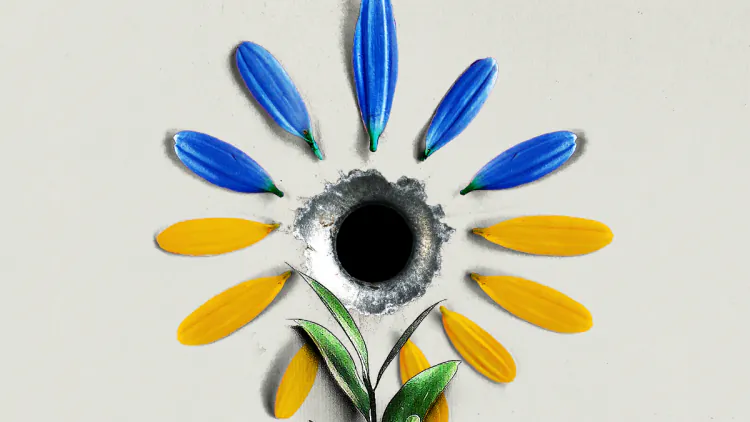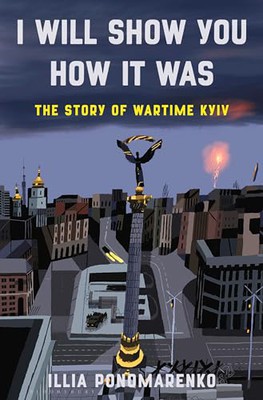Ukraine Has Changed Too Much to Compromise With Russia
My generation has tasted freedom and experienced a competitive, vibrant political life. We can’t be made a part of what Russia has become.

Here in Ukraine, we often react very emotionally when we hear people in the West calling for peace with Russia. According to some commentators, this would be achieved by means of a “compromise,” entailing Ukrainian “concessions” that would somehow satisfy the Kremlin and stop the war: major territorial giveaways, armed forces reduced to insignificance, no further integration with the West—you name it.
Most of us see such views as extremely naive, given the totalitarian and militaristic nature of Vladimir Putin’s Russia. Having built his rule on war hysteria, land grabs, imperial chauvinism, and global confrontation, Putin is hardly likely to stop even at a deal that most Ukrainians would find entirely unacceptable.
But that leads us to another problem that much of the Western media fail to fully appreciate: Ten years of confrontation with the Kremlin, and especially the past two years of Russia’s full-scale invasion, have fundamentally changed Ukraine. These changes are not superficial or easily swept away.
[Read: The one element keeping Ukraine from total defeat]
A little more than a decade ago, many young Ukrainians—including those, like myself, from Ukraine’s Russian-speaking east—were angry and restless, itching for something we saw just over the horizon. In high schools and universities, we read Montesquieu and soaked up such tantalizing concepts as the rule of law, democracy, and human rights. Western values felt native to our generation; we were open to the world in a way that our parents had never imagined. Most of them had ventured no farther than Central Asia for their Soviet military service, or maybe Moscow for the 1980 Olympics.
My peers and I wanted our country to have clean streets, polite police, and government officials who would resign at the exposure of petty corruption scandals. We wanted to be able to start businesses without passing money under the table, and to trust that courts of law would render justice. What we did not want were irremovable, lifetime dictators who packed the government with cronies on the take and sent goons to beat us up in the streets.
In Kyiv’s Maidan Square, starting in November 2013 and lasting into February 2014, demonstrators showed their fervor for such a future in what became known as the Revolution of Dignity. Some gave their lives to unseat Viktor Yanukovych, the kleptocratic ruler Moscow supported, and orient Ukraine unequivocally toward the West. At the site of desolation, armloads of flowers commemorated these dead. Yanukovych fled a country that despised him and had spiraled out of his control.
A new Ukraine began—and with it, a decade-long war of independence, as the Kremlin marked our revolution by seizing Crimea and infiltrating the Donbas region in the country’s east. For nearly a decade, Ukraine was fighting on two fronts: a military war against Russia, and an internal struggle for its revolution’s ideals, which meant stamping out corruption, obsolescence, unfreedom—everything that might drag the country back into the past.
Ukraine is still far from achieving all that my generation once dreamed of. But we do live in a country that is radically different from the Russian-influenced Ukraine of 2013—politically, mentally, and culturally. And we are starkly different from Putin’s Russia.
Ukrainians have tasted freedom and experienced a competitive, vibrant political life. We elected a comedian to be our leader after he faced down an old-school political heavyweight in a debate that was held in a giant stadium in downtown Kyiv and aired live to the nation. We’ve reinvented Ukrainian culture, generating new music, poetry, and stand-up comedy. Starting in 2014, we had to build our country’s armed forces almost from scratch; we are insanely proud of them, as they have fought heroically against one of the largest and most brutal war machines in existence.
A few weeks ago, I brought my dog to a veterinarian in Bucha, the town outside Kyiv where Russian forces committed a well-documented massacre in 2022. As the young doctor handled my dog, I noticed a large Ukrainian trident entwined with blue and yellow ribbons tattooed on her wrist under her white sleeve. For my generation of Ukrainians, such national symbols are an expression of pride in all we’ve made and defended.
I was with one of the first groups of journalists to enter Bucha after the Russian retreat in 2022. To describe the atmosphere is very difficult: I remember rot, stillness, a miasma of grief. The Russians had graffitied the letter V everywhere. On a fence along the main street: Those entering the no-go zone shall be executed. V. We followed the Ukrainian police as they broke through doors into premises inhabited only by the dead. Some of the bodies were charred and mutilated. I saw two males and two females lying on the ground, incompletely burned, their mouths open and hands twisted. One looked to be a teenage girl.
Outside the Church of Andrew the Apostle—a white temple that rises high over Bucha—Ukrainian coroners in white hazmat suits carefully removed layers of wet, clayish soil from a mass grave and placed 67 bodies on simple wooden doors under the cold drizzle. A tow truck hoisted the cadavers out one by one, hour by hour. Now and again, the rain would pick up, and the coroners would hastily cover the grave with plastic sheeting stained with dried gore.
“My theory is that there was a very brutal Russian commander in charge of Bucha,” Andriy Nebytov, the chief of police for Kyiv Oblast, told reporters at the church that day. “And they unleashed hell in this place.”
The Continent apartment complex used to be one of the finest in Bucha. I met a guy named Mykola Mosyarevych in a basketball court there. In his 30s and fit, he was a likely target for the Russians—a potential guerrilla fighter or member of the Territorial Defense—and so he’d spent the whole month in a basement. After the Russians left Bucha, on the day of my visit, he sat staring at a pair of ripped Russian fatigues marked with the orange-and-black striped ribbon of Saint George—a symbol of war and love for destruction. He wept. Over and over again, he said: “I just don’t understand. I don’t understand. I don’t understand why they would want to do all this to us.”
We all asked similar questions, and our fragmentary answers could bring little comfort to Mosyarevych or anyone else: lust for power, years of aggressive propaganda, a sense of impunity, a would-be emperor grasping at illusion. Deep down, fear.
[Read: Ukraine’s shock will last for generations]
Later that day, I walked alone with my camera through what was left of a Russian armored column on Vokzalna Street. Bucha’s defenders recalled that the Russians in this column had been moving carelessly and singing patriotic songs when Ukrainian forces struck their leading and trailing vehicles. The column stopped. The remaining Russian vehicles scrambled like bumper cars to maneuver through the wreckage, find a way out, and save themselves. But Vokzalna Street is narrow: They were trapped. A Ukrainian artillery strike left hardly any vehicle whole. The layer of ash on the ground was so thick that it crunched underfoot like snow.
What used to be a leafy green lane, part of my favorite bicycle route to Bucha and Hostomel, had become a cemetery. But within three weeks, Ukrainian workers had cleared away the rubble and repaved the road. Later, Warren Buffett’s son donated funds for Ukrainian authorities to completely renovate the street and construct new, Scandinavian-style, single-family houses with lawns and picket fences. Online, people posted tens of thousands of likes and comments under images comparing Vokzalna Street during the Russian occupation and after.
Springtime soon came, too, and with it snaking lines of cars, as thousands of people who had fled poured back into their hometown days after its liberation. Young mothers returned with their strollers. Time would absorb the grief and horrors of this war, as it had of so many that had come before.
Even so, I don’t want to think about what will happen to my dog’s veterinarian if the Russians make it back to Bucha. Or what will happen to Ukraine. After everything that’s transpired over the past decade—and especially given what Russia has become—Ukraine must not be made a Russian colony again.
Today’s Russia is a neo-Stalinist dictatorship led by an aging chauvinist. In the grip of his messianic delusion, Putin initiated the biggest European war since World War II. He seeks to eliminate Ukraine not only as an independent nation, but also as an idea. No concessions or compromises are possible with such a vision—not given the kind of country Ukrainians have made and fought to defend.
This essay is adapted from I Will Show You How It Was: The Story of Wartime Kyiv, published on May 7 by Bloomsbury.
What's Your Reaction?




















